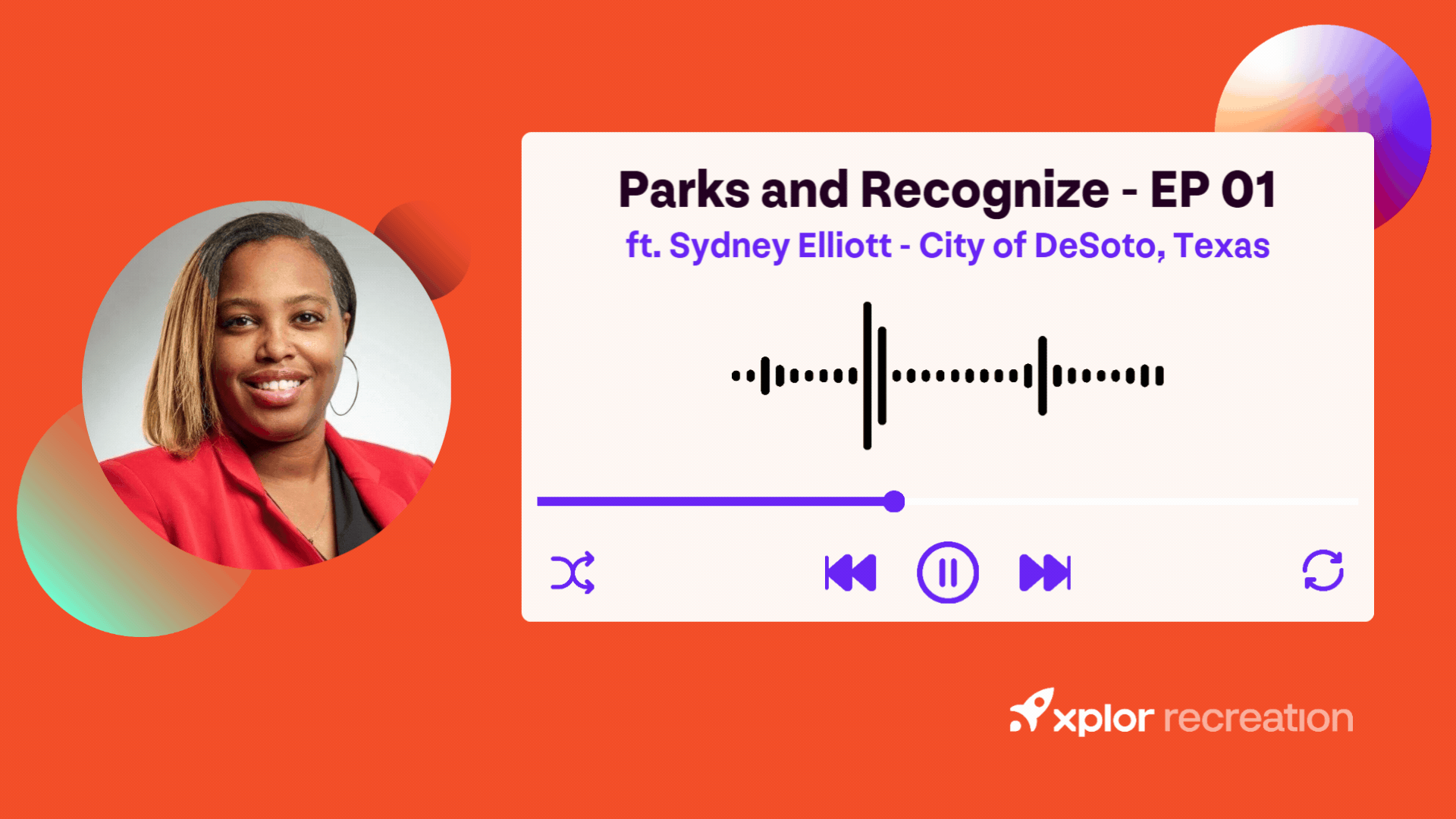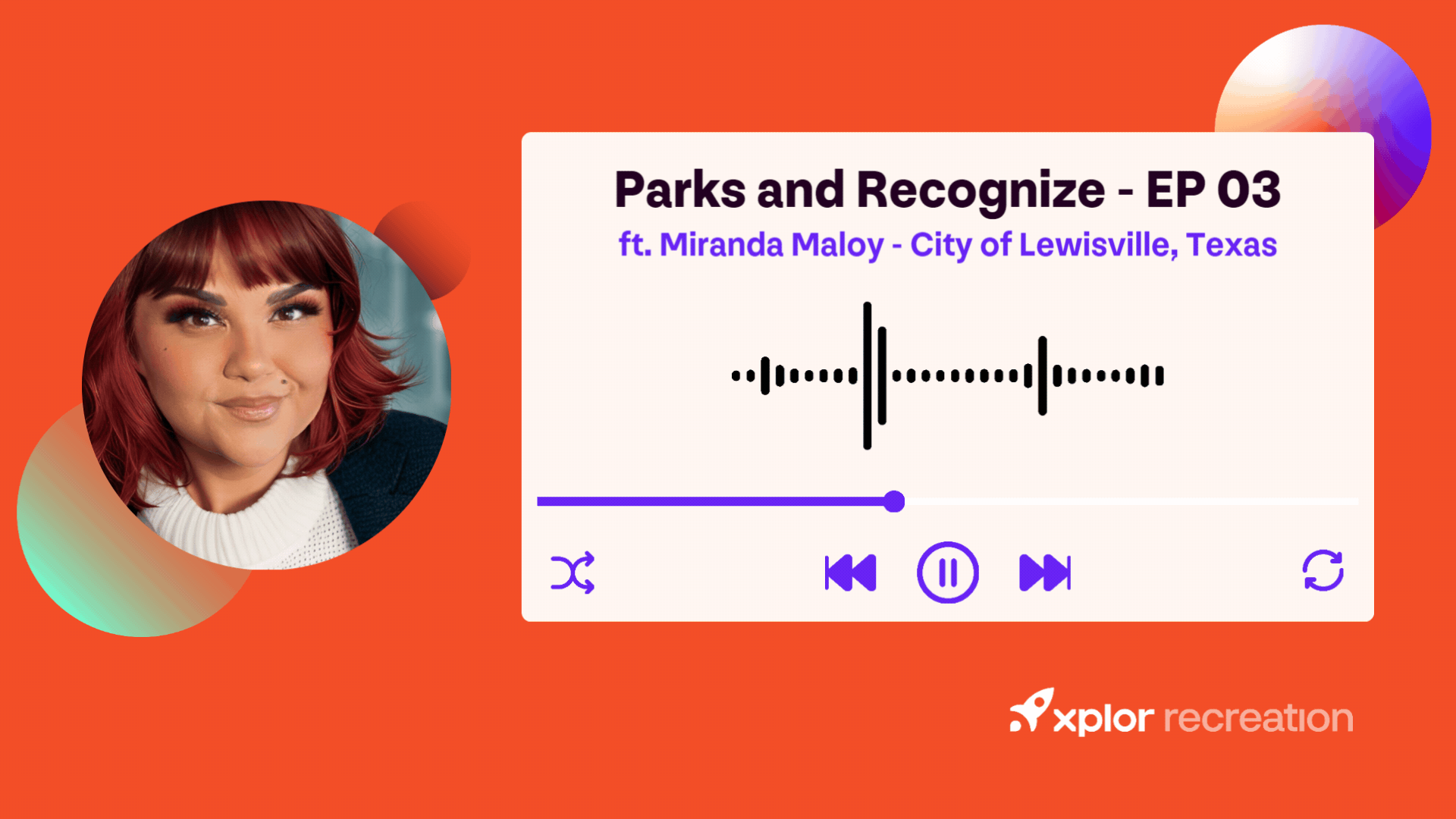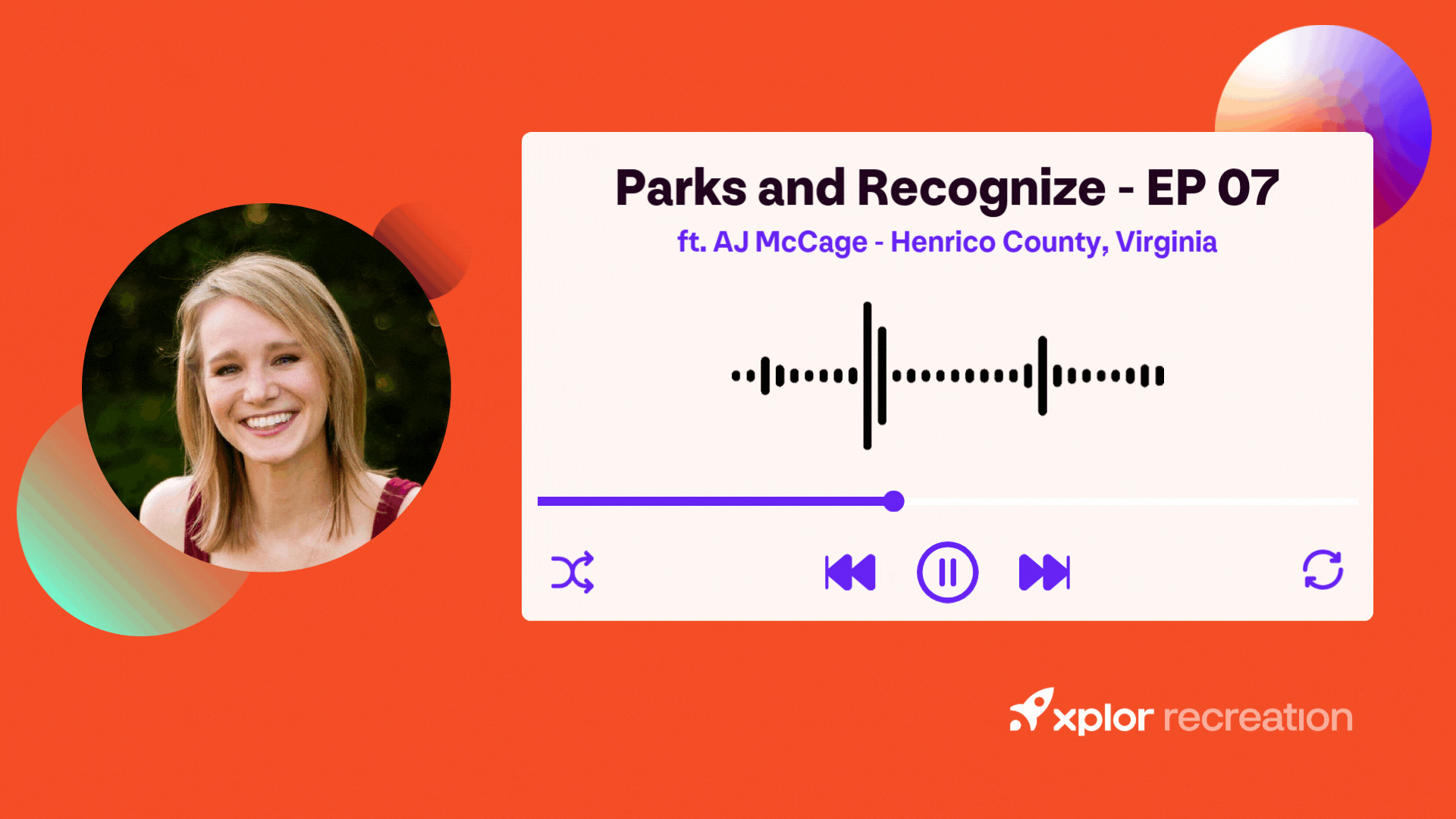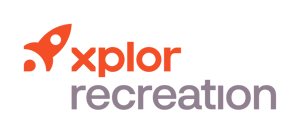The Parks and Recognize Podcast - Episode 8 with Johnathan O. Skinner
In the eighth episode of the Parks and Recognize Podcast, Datis Mohsenipour, VP of Marketing at Xplor Recreation, sits down with Johnathan O. Skinner, Director of Community Services for the City of Lake Elsinore, California.
Johnathan's background in parks and recreation is truly exceptional. Starting in the industry at just seven years old, he has dedicated over five decades to serving the communities he's been a part of. With extensive experience with organizations like NRPA, the NRPA Conference Program Committee, CPRS, and NRPS, Johnathan has helped shape parks and recreation on both state and federal levels.
In this episode, Johnathan reflects on his early career, the many communities he's served, and how he continues to support both his community and his team. He also shares valuable lessons from his distinguished career.
Tune in to the podcast or check out the interview transcript below!
Listen to Episode 8 of Parks and Recognize:
Prefer to Read the Interview? See Below.
Datis: I always like to set the tone of these interviews with a get to know you, like, icebreaker style questions. So my question for you is going to be, what's your favorite park that you've ever visited?
Johnathan: Well, mine, probably I was very fortunate in my career. I actually worked right on Lake Tahoe, a place called Incline Village, and my office was literally two football fields away from the lake. I started out as a superintendent and actually turned the position into an Assistant, Parks and Recreation Director, and that was probably one of my favorite as far as having recreational activities available to me and to my family. My kids learned how to ski, and snowboard there, and they learned how to water ski on Lake Tahoe. I went fishing in Lake Tahoe. We had two golf courses, and so I played both of them periodically. I would say that's probably one of my favorite places. Any place that I actually work or have a place to go where I have an opportunity to experience and relax, I think is my favorite place.
Datis: You must of had some really good lunch breaks out there.
Johnathan: Very, very much so. I'd be able to walk down and when you're able to look at one of the most pristine lakes in the entire world, one of the clearest lakes, it's just amazing. Then we had a lot of snow there because the elevation's so high, is that I got to enjoy so many different activities in one location.
Datis: That's pretty darn special. Well, thank you for sharing that, Jonathan. How long have you been actively working in parks and recreation?
Johnathan: Well, Datis, people don't believe me, but I actually started when I was seven years old. I knew what I wanted to do way back then because, my dad was in the air force, but he also worked for Martin Marietta doing missiles and those kind of things. My mom worked at the local hospital, and from those two I was able to get a really great grasp of giving back to the community and giving to people even at the age of seven. I started as a junior counselor in training, I was a junior CIT. The person that that took me under their wing was one of the football players that played with my brother in high school. He had me doing things that other counselors in training were doing who were at the age of fourteen. I got to put on games and do different things and assist. We lived in Lompoc, California, which is in Central California, and we would actually take bus trips down to the Forum and go watch Magic Johnson play basketball. They had me assisting on those kind of things. So, I had a great love of doing that even at the age of seven, and so that's what got me started in this field. I'm sixty one now, so I've been doing it for quite a while.
Datis: Well, good for you. I was going to say, fifteen years you've been doing this until you mentioned Magic Johnson, that's incredible. From there, throughout your teenage years, did you continue working in parks and recreation before you then went to school for it, or what was that path like?
Johnathan: Yeah, so, when I was younger, like most kids, I started a paper route. I had my own lawn cutting business. There was eight of us in the family, six boys and two girls. Our parents believe very strongly in education. I have a sister who has a PhD. I have an older brother who was in the air force and worked in the B-1 bomber. All my other brothers and sisters are very talented in music and those kind of things. And I'm like the more of the public speaker kind of guy. They gave us this strong sense of family and community. I started working, after the paper route, I worked at the local carpet cleaning place, and then I decided to go into recreation. So, I did it, part time. Ken Osteen, who was my mentor in Lompoc, had me work part time at the local parks and recreation park, where I was a recreation leader. Then I went over into Allan Hancock and started working, three quarter times. I would go to school from eight to two, and then from two to eight, I would go to work for the city of Beverly Hills and do my education and everything. I put myself through college, and was able to get my bachelor's and my master's in public administration all through recreation. I've been in it for forever.
Datis: For those listening today who aren't familiar with you, although I'm sure that's very few folks, where are you working today, and what is your current role?
Johnathan: I work for the beautiful city of Lake Elsinore in Southern California, Riverside County, called Inland Empire, and I'm the Director of Community Services. What that is, is we are the recreation arm of parks, recreation, and community services. We do anything from your typical recreational programs that we just talked before we went on about, pickleball and those kind of things. But we also work with the school district and my team that I have the honor to work with, not supervise, but work with, they created an after-school program in the schools that the schools actually pay us to come in and do. It's pretty incredible. But also, we run a campground here called, Launch Point. We inherited a park campground years ago without any resources, and it was what I consider rustic. It was on septic, and it had the old copper wire thing around it. And myself and some of the team were part of a think tank of what do we want to be when we grow up as a campground. Before this position, I happened to be honored to work down in San Diego at Santee Lakes where I was the director down there. So we actually came up with what we wanted the park to be. And we wanted to be a resort, not just a park. We want people to come and enjoy, the amenity that we have. We have a three thousand service acre lake, fourteen square miles that abuts the campground. We basically blew it up, put in all water, sewer, and electric. We have hundred and ninety campsites. Plus, let's say, if you wanted to come camping, you didn't have a camper, we also have eight or nine Airstreams that have all the hookups and everything. If you didn't want to do that, we also have these things called yurts, which are soft sided tents that are available for people that are able to come. We have seven of those, and each one is themed. My wife and I, we do staycations. We'll stay there, and there's one called the beach. It's made for two people. The theme inside is the beach theme. We have one that's called the boho, which is the Moroccan theme and the lodge, which is the wooden theme. We have one that is a rock and roll theme, too. Each one has its own individualized deck. Well, the rock and roll actually has a deck that has lighting on the outside that just like a stage. Then on the inside, it has old, rock and roll pictures, and the bed is a stage, and the drawers are speakers and everything. That's one of the things that we do as well. We oversee sports and creating new programs, and working with the community on special events. We do some really great special events here. Our biggest one is Winterfest. We have, as we say, twelve thousand of our closest friends who come down for a nighttime parade and festivities all night long. So I do a couple things.
Datis: Yeah, like maybe a seven-page job description is what we're looking at approximately.
Johnathan: Yeah, I have to change the font down to a two if I want. It's just what we do and what anybody in our field does, is we're memory makers. That's what we really look at it doing is we make memories. We talk about here in our city, we talk about the five W's. Who we're doing it for, what we're doing it for, where we're doing it, when we're doing it, and why we're doing it. You always have to have your why. We always talk about whenever we're doing something, the five W's, and then the ‘H’ is, how we're going to do it, how much it's going to be, how are the people going to be positively impacted. When we look at those five W's and the ‘H’, it helps us create programming that meets the needs of the community.
Datis: I love that so much. It’s so deeply rooted in anything that any park and rec professional does. It always starts with the community members and the whys and the hows. Thank you for sharing that. You did mention as well that your event with a couple thousand of your closest friends. I think that's actually a really great segue into my next question. I'm very much a firm believer that Parks and Rec pros are the heartbeat of communities everywhere. I just want to take a moment to pick your brain on what community means to you.
Johnathan: Well, community means a couple of different things. One is, now we talked about it, why we have been communicating for the last couple of weeks, is building people up on their positive qualities. Too much we focus on the negative and to build a really good community within your organization, you need to find out what people do well, and you need to make sure that you're able to stretch them to do even better. You try not to focus on the negative too much because too many people do that. For our city community, our work community, that's the thing I look for. For community, we believe a lot, and it's an overused word by a lot of people, but inclusion. Making sure that every person in our city or whatever city I work in has an opportunity to experience the same kind of things that I do, but in the way that they enjoy it. One of the projects that we're doing right now, one of our staff, Ben Foster and, Justin Harding, are working on changing one of our parks to a universally accessible park. What that means is, we have a great community leader who created the Challenger League, it's a league for those with mental and physical disabilities. They couldn't play regular baseball, but we were able to take one of our fields and make some basic modifications that are further than the play. Well, they've done a lot of research in order for us to be able to take that park and that playing field and make it more universally accessible, meaning for wheelchairs, for people who don't have sight, for people who have learning disabilities and their families. That in the community itself. I'm really excited because we were able to talk to our council. 5-0 they said, we have to do this. We started when we first came on about ten years ago, myself and Beau Davis, who's our Assistant Director. When the public works would do the parks, we want to make sure that there's a little, as we say, sprinkle a little cinnamon on it of having accessible and inclusionary pieces of equipment into the park. Now with this inclusionary park, it's not going to just be for those individuals who have those opportunities to for success, but it's also available for the entire community. Again, it makes it more inclusive for all members of our community to come in and participate. That's what community means to me.
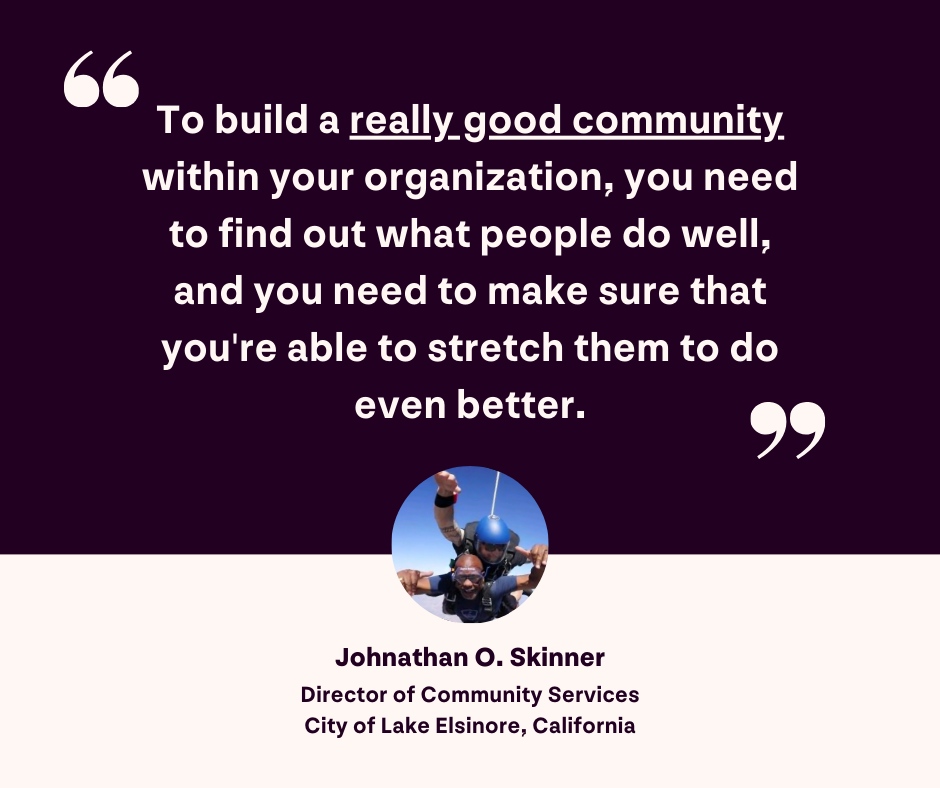
Datis: I love that, Jonathan. Thank you so much for sharing that. Onne thing that really stood out to me was being able to enjoy it and how they want to enjoy it, because it's not going to be the same for everybody. It's not going to be the same experience, and no two people are necessarily going to enjoy things the same way. I really love that you called that out and really love to hear about the work you folks are doing. It sounds incredible. Jonathan, as a close follower of your LinkedIn profile, there's no shortage of incredible things you're doing on a regular basis, and, I mean, you just shared one of many. I'd love to hear a little bit more about some of your personal accomplishments in your professional career that you're most proud of and why they're special to you.
Johnathan: It really has nothing to do with me per se. More of the opportunity of giving others to be better than me. An accomplishment for me is, and I learned this from a director a long, long time ago, and I learned it from many other directors saying the same thing. You need to give people an opportunity to give a path, to follow a path and if it's not there, have them create their own path for others to follow. I believe strongly in succession planning. And when I leave a location, I hope that I've done the proper justice to the people that I work with, that they're the next ones to take my place. I have had the honor of being able to do that several times, and also been able to see them go on to other positions and be better than I was in their new position. That to me is one of the greatest accomplishments. I can do stuff, and I've done different kind of things I'm proud of. I was identified by the California Parks and Recreation Society of one of the 50 over 50. And there's a whole magazine that was done a couple years ago. And I've I've written for papers, and I've done articles, and I've spoken at conferences and that kind of stuff. And that's all great. It makes me feel great. But what makes me feel greater is when I go on LinkedIn and I see somebody that I work with that I had the privilege of working with or being their supervisor or director, and see them accomplish the things that they wanted to accomplish. I always ask that of my team, what do you want to be when you grow up? And they say, well, I want to be you. Okay, well, let's figure out how you're going to be me. That's why we have some really big projects that are going on right now. One is creating a new master plan. There hasn't been one here for years. Do I need to do it? Do I need to be the person in charge of it? Not really. Because at some point in time I'll be retired. Wouldn't it be great if it’s actually Ben Foster who is taking this project that’s going to dictate how recreation is done for the next twenty years, and his signature on it. He's the one who's working, who did all the interviews, the RFP, created the RFP, and conducted the interviews. And I sat in on it, but he's going to be the one that's going to be directing it to that next level. So when I'm out fishing, because that's one of the things I love to do, but now I'm out fishing and I'm still in LinkedIn. I'm looking at things, and he's a director someplace or Justin or Beau is a director here or whatever. That's that kind of accomplishment that I'm really proud of. Passing that legacy on of giving them that chance to make their own path and be who they want to be.
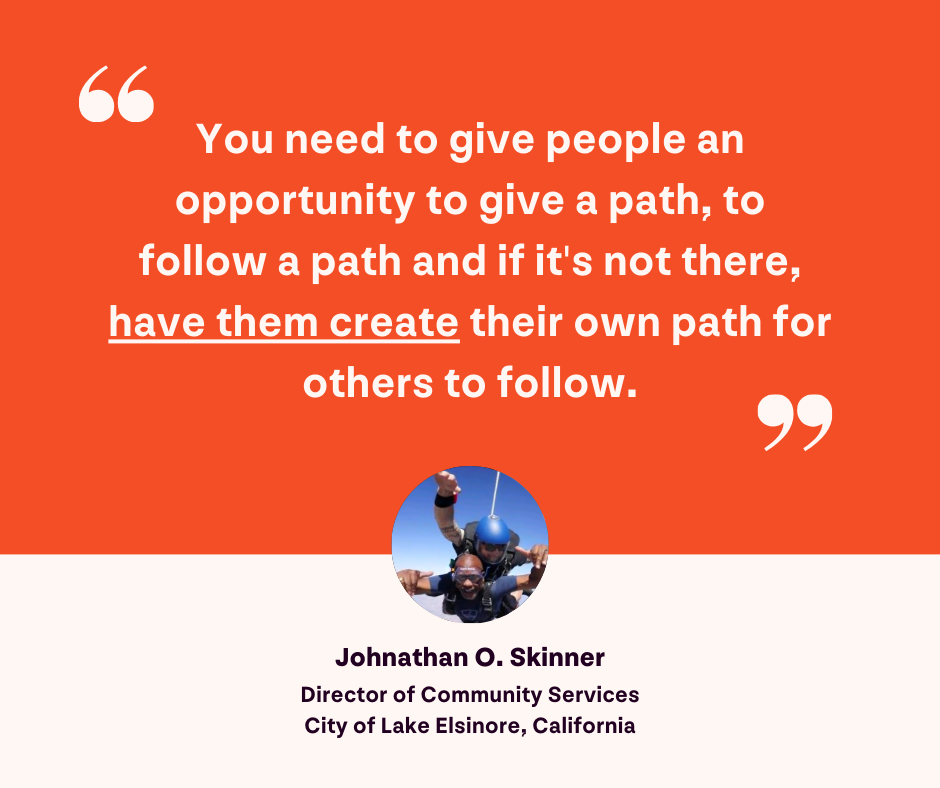
Datis: That's so special. Thanks for sharing that. And I'm sure your entire team and the people you've worked with in the past are grateful for the mentorship that you've given them and the roads you've paid for them. That's really great. Thank you. I've also noticed that among the many things you're doing, your seven-page job description, there's also a page or maybe two dedicated to work that you do for the NRPA. Can you tell us a little bit about what you're currently doing and maybe what you've done in the past because it's not your first round, is it?
Johnathan: No, giving back to organizations that give you the opportunity has always been something that I love. I started when I was in California, CPRS, the California Parks and Recreation Society. And I started there as a student on in on the CPRS, district as a representative. I then went on to be vice president of our district and president of our district. I think that right there is an opportunity to lead and to give myself opportunities to not perfect, but improve different avenues of my myself. How I communicate, how I write, how I speak, how I deal, work with those in leadership positions. So, you know, CPRS really helped me there. Then I moved over to Reno, as I mentioned before, Inland Village, and I became really involved with the Nevada Recreation and Park Society. I was an assistant VP there and have been a president there, and worked a lot on sessions and session reviews. I think that kind of stuff is really, really important because what that does is that gives people in our profession an opportunity to learn from somebody else. Now with NRPA, it's really funny. One of the the people that used to work for me, Sven Leff, who is now in in Truckee, he was a superintendent in in Idaho at the time. He says, ‘Hey, Jonathan. There's this thing called the CPC, which is the conference planning committee, and what we do is we put out a large net to the entire, NRPA, which is about ten thousand members or so. And we say, hey, do you have some knowledge? Do you have something that you want to share?’. We have different opportunities, either a speech session or an hour-long session or there's some two-hour sessions. Fill out these forms and go ahead and submit them. Well, we would review all in from I think the last one we had, like, eight hundred sessions that we read through, all eight hundred sessions. Then we changed it at one point in time where we had specific ones. I think I had facilities and maintenance on facilities. But then we started reading them all again, which gave us a large breadth of information and professionals in our field that are out there that people have a chance to learn from. I've been doing that for the last six years. Actually, this is my last go around for the Atlanta one. It's really great. I've had opportunities to actually present at CPRS and NRPA and in Nevada, the last couple sessions I've done has been on, staff motivation and recognition because I believe very strongly in celebrating our victories, understanding our opportunities for success or failures, but actually recognizing the successes. Not only of staff, but of volunteers. But not only of volunteers, but also those who give us an opportunity to be successful. Those would be our city managers, our councils, our elected officials that a lot of times, they only get the negatives. They also need to get the positives from their staff that show their appreciation for having the ability to do what they do.
Datis: I figured it'd be something of that given just the positivity that that you wear. It doesn't surprise me at all that those are the topics that you're sharing the good word around, a purveyor of positivity, if we would. Well, that's really special. You've been doing that for quite some years, and this is your last go around.
Johnathan: Yeah. What the CPC likes to do is bring in new blood. I've had friends who served on it for six years and took a four-year break, and they came back again. I think it's time for a new crew to come in and give their take and their put their mark on what will be learned over the next several years.
Datis: Well, that's very special, and I'm sure that your contributions will be missed, but it'll be great to get a new generation of contributors as well. Well, Jonathan, when you're not busy empowering your community, doing all the jobs on your job description, volunteering your time with the NRPA and other associations, you talked a little bit about fishing, but what can we expect you to be doing in your spare time?
Johnathan: Fishing. I actually love to fish. There's a lot of things I love to do. One is really about family and connections, and with my wife. This last Thursday we celebrated thirty-two years of being married. We actually just got these, we have our wedding date on our arms, both the same. But what I do in my spare time, my wife and I get mani pedis every three weeks. It's a time for us to to spend time together without anybody else. And then we go down to our local pub. We also always have dinner and drinks there. So, spending time with my wife is really important. Spending time with our grandkids, they live in Texas, so we take some trips, whenever we can. The other things I do are set myself goals. Resolutions you just don't do. But goals you alter them to make them functional. At the beginning of this year, I set a goal for myself to to fish in Mexican waters for big game fish. I love deep sea fishing, but I've never done big game fish. So, we actually were on a cruise, and I set up an excursion for the cruise. Janelle was able to go and hang with some people that we met. I actually went out on a Pongo and caught a hundred and eighty pound marlin. I was very impressed with that because I set a goal that I wanted to do something just to be out there. Well, the thing is, I actually got the thing in thirty minutes. Not that bad for your old sixty-year-old guy at the time. But, my wife and I spend a lot of time just doing things. We take a lot of, staycations. We have some places around that we love to stay in. We play Topgolf. I just love the business model. My wife and I have been to twenty six of them across the country. Anytime we take a vacation, we make sure we go to a Topgolf, and we do these little videos on Topgolf. We came up with little saying to go to Topgolf, they'll treat you like a pro every time. We send the videos to the different managers that are at these different places. We never ask for anything. We play full boat all the way through. It's kinda like what I do with my team. I want to celebrate everything they do, and they know, ‘Jonathan always asks us, pictures, pictures, pictures, tell our story’. Put shekels in the bank. What we mean by that is anytime you do something good, make sure that they know that you did something good. So, right to the budget time, they go, ‘oh yeah, I remember that new program or project they did. Let's give them a couple extra bucks here, or let's not take money away from here. Let's actually take away from some other department’. Then that way, they're able to see the fruits of their labor.
Datis: Makes sense. Celebrate every win and make them known. Absolutely, I love it. Thank you for sharing that. I've got one more question for you before we wrap up, and this is one of my favorite ones to ask, actually. Given all the experiences you've had, all the wisdom you can share, what's one piece of advice you'd recommend to anybody in the parks and recreation profession?
Johnathan: Don't be afraid to fail. Too often, and including myself even to this day,is we don't try to do things because we're afraid of failure. I constantly hear this quote by Michael Jordan. And he talked about being charged to make the winning shot and missed it. He failed, and that's why he succeeded. There’s an old saying too, is that if you're not failing, you're not trying. That's a piece of advice I would give people, is you're going to fail, but fail forward, learn from your mistakes. Take people along the ride with you because that will help them be successful as well.
Datis: I love that. I love that. Actually, one of my favorite quotes is a Martin Luther King quote, I believe, which is I don't lose, I win or I learn. I think it's such a debilitating thing to worry about failing because it's so limiting. You can't reach your potential if you're you're not afraid to try things out because you're scared of making a mistake. But more often than not, those mistakes aren't going to make the world stop, the world will keep turning, your job will continue.
Johnathan: I had a boss, Rick Putnam, this is earlier in my career, and I was doing something, and it didn't go the way that I wanted to. And I internalized a lot of I don't want to call it perfection, I call it improvement. Because, again from another saying, when it improved, I did improve. And he looked at me and says, ‘hey, Jonathan, did anybody die? So, then why are you making it feel like somebody died?. It just didn't go the way you wanted it to. So, learn from it, make sure it doesn't happen again, and improve’. They'll say practice makes perfection. No, practice makes improvement, and things improve us.
Datis: That's so powerful. Well, thank you so much for sharing that. Jonathan, thank you so much for taking the time to sit here and chat with me. I'm sure our listeners are going to take much away from this conversation with you. There's so many great takeaways from our conversation today.
Johnathan: Well, thank you for the invitation, and keep up this great work.
Find Johnathan on LinkedIn here.
Wrapping it up:
Stay tuned for more inspiring episodes as we continue to spotlight remarkable parks and rec professionals. Want to share your story on a future episode of Parks and Recognize? Contact xr_marketing@xplortechnologies.com.
